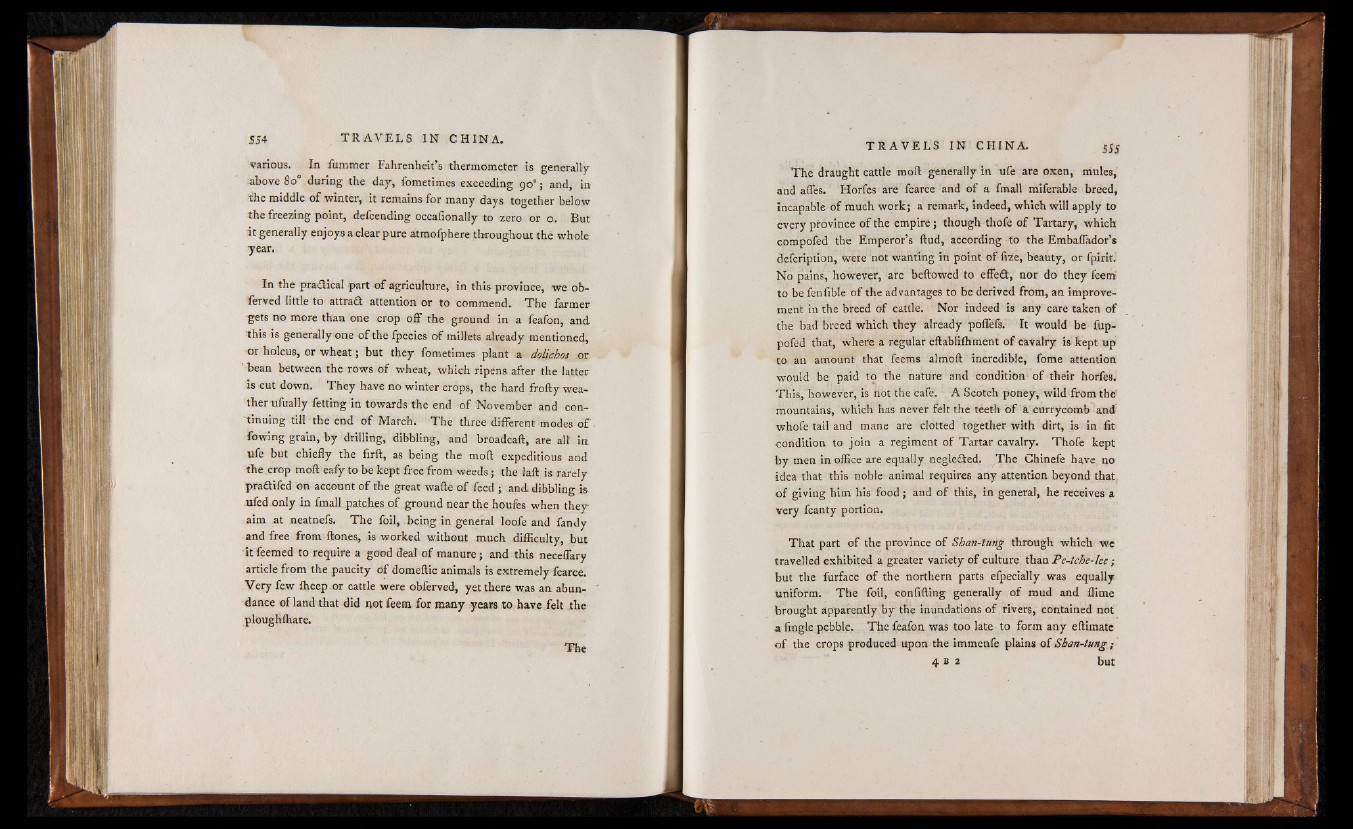
various. In fummer Fahrenheit’s thermometer is generally
above 80° during the day, fometimes exceeding 90°; and, in
the middle o f winter, it remains for many days together below
the freezing point, defcending occafionally to zero or o. But
it generally enjoys a clear pure atmofpbere throughout the whole
year.
In the practical part o f agriculture, in this province, we ob-
ferved little to attraft attention or to commend. The farmer
gets no more than one crop o ff the ground in a feafon, and
this is generally one o f the fpecies o f millets already mentioned*
or holcus, or w h ea t; but they fometimes plant a dolichos o r
bean between the rows o f wheat, which ripens after the latter
is cut down. T h e y have no winter crops, the hard frofty weather
ufually fetting in towards the end o f November and continuing
till the end o f March. The three different modes o f
fowing grain, b y drilling, dibbling, and broadcaft, are all' irt
ufe but chiefly the firft, as being the moft expeditious and
the crop moft eafy to be kept free from weeds; the laft is rarely
pradifed on account o f the great wafte o f feed ; and dibbling is
ufed only in fmall patches o f ground near the houfes when they
aim at neatnefs. The foil, being in general loofe and fandy
and free from ftones, is worked without much difficulty, but
itfeemed to require a good deal o f manure; and this neceffary
article from the paucity o f domeftic animals is extremely fcarce.
V ery few fheep or cattle were obferved, yet there was an abundance
of land that did not feetn for many years to have felt the
ploughlhare.
T h e
T h e draught cattle moft generally in ufe are oxen, mules,
and affes. Horfes are fcarce and o f a fmall miferable breed,
incapable o f much work; a remark, indeed, which w ill apply to
every province o f the empire; though thofe o f Tartary, which
compofed the Emperor’s ftud, according to the Embaffador’s
defcription, were not wanting in point o f fize, beauty, or fpirit.
No pains, however, are bellowed to effedt, nor do they feem
to be fenfible o f the advantages to be derived from, an improvement
in the breed o f cattle. Nor indeed is any care taken o f
the bad breed which they already poffefs. It would be fup-
pofed that, where a regular eftablilhment o f cavalry is kept up
to an amount that feems almoft incredible, fome attention
would be paid to the nature and condition o f their horfes.
This, however, is not the cafe. A Scotch poney, wild from the
mountains, which has never felt the teeth o f a currycomb and
whofe tail and mane are clotted together with dirt, is in fit
condition to join a regiment o f Tartar cavalry. Thofe kept
by men in office are equally negle&ed. The Chinefe have no
idea that this noble animal requires any attention beyond that,
o f giving him his food ; and o f this, in general, he receives a
very fcanty portion.
That part o f the province o f Shan-tung through which we
travelled exhibited a greater variety o f culture than Pe-tche-lee ;
but the furface o f the northern parts efpecially was equally
uniform. The foil, confiding generally o f mud and flime
brought apparently b y the inundations o f rivers, contained not
a fingle pebble. The feafon was too late to form any eftimate
o f the crops produced upon the immenfe plains o f Shan-tung ;
4 b 2 but